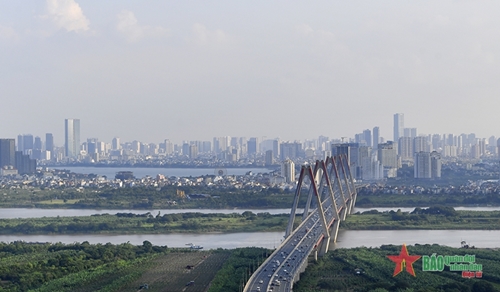In his article to the People’s Army Newspaper, Doctor, Lieutenant General Pham Thanh Lan, former Director of the Department of Foreign Relations under the Ministry of National Defense, pointed out a number of highlights in the country’s journey of innovation and international integration
Firstly, political stability is an advantage for Vietnam to build peace and prosperity. This is the key factor and the basis for planning socio-economic, cultural development strategies; ensuring the coherence and consistent implementation of policies.
Since 2000, Vietnam has continued to speed up political reform coupled with economic reform. It has constantly supplemented and developed theory on the transition path to socialism and basic political theoretical contents, contributing to the making of the Party's strategic decisions in the renewal and integration period.
    |
 |
|
A corner of Hanoi capital city seen from Nhat Tan Bridge (Photo: Tuan Huy) |
As a result, the political reform work, especially Party building and rectification and consolidation of political system, has reaped outstanding results. Particularly, the state power is exercised uniformly, with close coordination and strict control among agencies. The political system is arranged to be compact, and operated effectively and efficiently in accordance with the socialist-oriented market economic institutions. The people's right to mastery in all areas of social life is promoted and put into practice. The human rights and citizens' rights are recognized, respected and guaranteed by the State and people are happy. These have contributed to gradually realizing the goals of a rich people, a strong country, democracy, equality, and civilization and people enjoying independence, freedom, happiness and having conditions to develop comprehensively.
Secondly, Vietnam's strong and sustainable economic growth has become a “highlight” in the “dark picture” of the global economy. Vietnam's GDP growth rate is relatively high, with an average increase of 7.26% in the 2001-2010 period and about 6% in the 2011-2020 period even in the context of the heavy impact of the COVID-19 pandemic. In 2020, Vietnam's GDP still grew positively by 2.91%, reaching USD 271.2 billion, showing the country’s success in controlling the pandemic and minimizing its negative impacts on the economy. Vietnam now has trade relations with 224 partners and more than 500 international organizations. It has signed over 90 bilateral trade agreements; joined 15 free trade agreements (FTA) and has been negotiating two others.
Thirdly, the country’s foreign relations have been deepened and it has comprehensively integrated into the world. Consistently implementing a foreign policy of independence, self-reliance, multilateralization, diversification, pro-active and active international integration, Vietnam has achieved important results of step-by-step breaking the siege, embargo, expanding relations with other countries and organizations in the region and the world. To date, Vietnam has established diplomatic relations with 192 countries, including 190 out of 193 U.N. member countries. Vietnam is also a reliable and responsible member of many regional and international organizations such as ASEAN, WTO, APEC, IMF, and WB. Achievements in external affairs have contributed to attracting large foreign resources for national socio-economic development, maintaining peace, stability, and security in the country; effectively resolving border, territorial, sea and island issues with relevant countries, firmly protecting the sovereignty and territorial integrity of the Fatherland, and protect socialism.
Fourthly, defense and security potential is comprehensively-strong. Along with the outstanding outcomes in national renewal, the defense and security field has constantly been built and consolidated by the Party, State and people. Therefore, the whole people’s defense potential and posture coupled with the people's security posture has grown comprehensively-strong, with new developments, meeting the requirements of the Fatherland protection task. The people's armed forces, especially the People's Army and People's Public Security force, have continued to be built in a revolutionary, regular, elite, and gradually-modernized direction. The legal system on defense and security has been supplemented and completed with significant increase in the number of legal documents on defense and security. The defense diplomacy work has been promoted. Vietnam has established defense ties with more than 100 countries, set up defense attaché offices at the U.N. and in many countries, and vice versa, many countries have set up defense attaché/military attaché offices in Vietnam.
Fifthly, the Vietnamese culture has initially transformed itself into a goal and driving force for the country's sustainable development. Culture is the key to consolidating the spiritual foundation of society, contributing to awakening people’s creativity, promoting growth and sustainable development. Recently, Vietnam has made positive changes in institutions and policies to promote Vietnam's cultural industry market, developing culture into a “soft power” to improve competitiveness and international integration. The State has also created favorable conditions for the development of cultural products, belief and religious activities; preservation and promotion of the values of the national cultural heritage.
Sixthly, positive changes have been also seen in the fields of health, education and training, contributing to ensuring good healthcare for people and developing national human resources. People's material and spiritual lives have been constantly improved thanks to the good implementation of national target programs. Together with economic growth, the work of social security and job generation for workers has been strengthened and people's lives have been improved. Vietnam's hunger eradication and poverty reduction work has been recognized and highly appreciated by the world. In 2000, the country basically eliminated chronic hunger. Based on the country's multidimensional poverty standards, the rate of poor households decreased from 9.88% in 2015 to less than 3% in 2020, and the rate in the 2016-2020 period fell by an average of over 1.4% per year. From a poor, backward and malnourished country, Vietnam has risen to become a middle-income country.
On its journey of renewal and international integration, Vietnam has gained great and comprehensive achievements with its position and strength raised to new heights, creating a premise for Vietnam to continue to renovate and develop in the future. The renewal journey with the harmony between the Party's will and the people's hearts, along with other favorable conditions, has created a driving force for Vietnam to move steadily towards socialism
Translated by Mai Huong